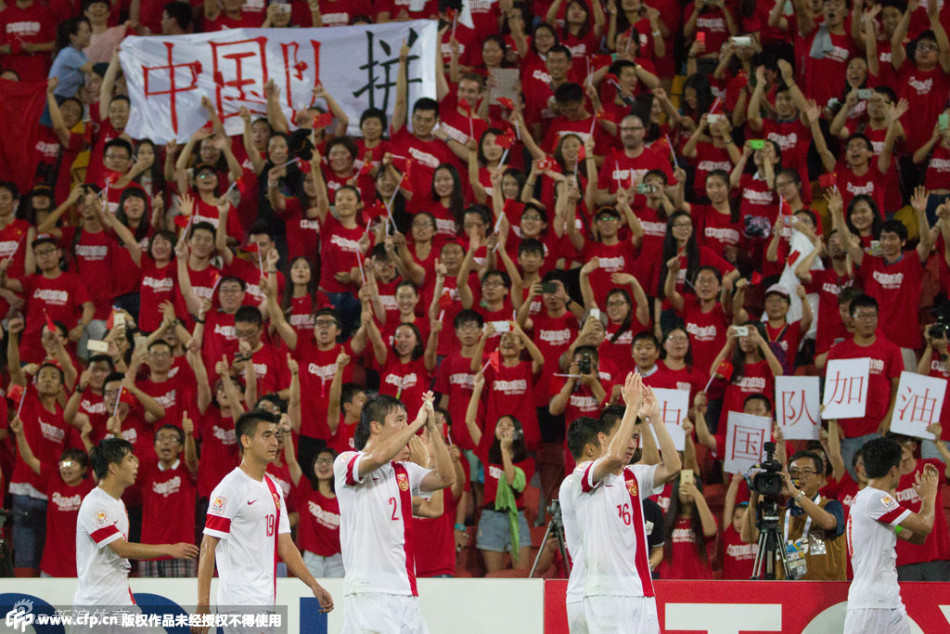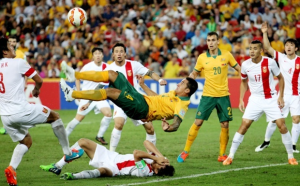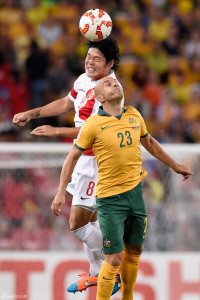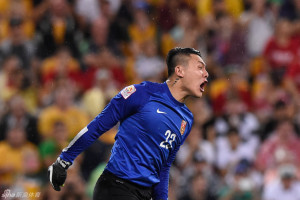A pair of second half Tim Cahill goals was enough to bring China’s Asian Cup run to an end at the quarter-final stage in Brisbane. Cahill netted an acrobatic overhead kick three minutes after the break and added a second with a trademark header on 65 minutes.
For the Chinese team, it was a disappointing conclusion to an otherwise successful tournament, but they can have no complaints about the result and were ultimately grateful to goalkeeper Wang Dalei whose excellent second half performance kept the losing margin down to just two.
ASIAN CUP QUARTER-FINAL
China 0
Australia 2
Cahill 48′, 65′
Despite winning all three of their group games, China went into this contest knowing that their opponents were heavy favourites to make it to the last four. However, despite fielding a conservative line-up and surrendering the majority of possession, it was they who looked the better side in the first 20 minutes of the match. Seeking to use the pace of Wu Lei and Sun Ke to undo the Socceroos defense on the break, China’s best opportunity to open the scoring came in the 18th minute when Wu sprinted menacingly through the Australian defense before seeing his shot blocked by Alex Wilkinson.
Having failed to capitalize on their early pressure, the Chinese were unable to keep up the frantic pace with which they were pressing the ball and began allowing Australia back into the game. While they were far from dominant, the Australians had three decent chances to score in the latter part of the first half. Wang Dalei’s first good save, a one handed stop from a powerful Matthew Leckie effort, was bookended by free headers from Mile Jedinak and Trent Sainsbury that both failed to hit the target.
The game was still goalless at the interval, but those first half chances were a warning from the Australians and it didn’t take them long to find the back of the net after the resumption of play. In the 48th minute, a Mark Bresciano corner was headed away by Zheng Zhi who collided with Tim Cahill in the process. Zheng fell to the turf and when the ball was headed back into the box by Ivan Franjic, nobody had picked up Cahill in their captain’s absence. Despite finding himself in space, the New York Red Bulls forward still had a lot to do with his back to goal and was able to produce a clever overhead kick with the outside of his foot that gave Wang no chance to make a save.
The goal delighted the crowd and spurred the Aussies to attack further while forcing the Chinese increasingly onto the back foot. On the hour mark, Bresciano blasted over from close range when he ought to have scored and two minutes later, Wang was called upon to push a Cahill shot wide after the 35-year-old had turned Zhang Chengdong in the box. Just a minute after that Wang had to make another save from a header but less than two minutes later he was picking the ball out of the net courtesy of a sublime header from Cahill.
Left back Jason Davidson played a high cross in to the former Everton forward who found himself in space between Ren Hang and Jiang Zhipeng. Anyone who has seen a highlight reel of Cahill’s career will know that giving him time to plant a header is dangerous and China were punished accordingly when the veteran generated a remarkable amount of power to drive the ball into the bottom right hand corner and beyond the reach of Wang.
Perhaps satisfied that they had done enough to advance to the semis, the hosts seemed to take their foot off the gas and allowed China back into the game. Unfortunately, Guozu were unable to find the breakthrough required to set up a tense finish and a long range drive from Jiang Zhipeng was the only time they tested Socceroos goalkeeper Matt Ryan.
There was still time, however, for Wang Dalei to enhance his growing reputation with a trio of saves in the dying minutes as China pushed further forward and left themselves more vulnerable at the back. Two solid close range stops were followed by the pick of the bunch, a full-stretch lunge to turn substitute Mark Milligan’s low driven effort around the post.
At the full time whistle, the jubilation from the home supporters was counterbalanced by the distress of the significant Chinese contingent amongst the 46,000 in attendance. After such a promising start, those Chinese fans had seen their side outclassed and outplayed over a 90 minute period which demonstrated that, although China showed significant signs of quality in their first three matches, they are still some distance from the Australias, South Koreas and Japans who inhabit the top tier of Asian football.
That being said, China were largely holding their own until the first goal and had it not been for Zheng Zhi’s tumble and Cahill’s moment of inspiration it is feasible that they may have held on and stolen a goal on the counter. For the fourth straight game, Perrin fielded a significantly changed team and this was the most defensive line-up by far. Wu Lei and Sun Ke were the only primarily attacking players in the side and Cai Huikang’s inclusion in midfield was a clear indication of Perrin’s unambitious intentions.
In the early stages, when Wu Lei threatened a nervous Australian defense with his pace, the tactic looked as though it might work, but the issue was that, once Australia got the opening goal, there was no real plan B to get down the field and push for an equalizer.
However, despite the disappointing conclusion, it would be wrong to suggest the tournament should be viewed negatively as a whole. Generally, Perrin got his tactics right and China’s impressive progression to the knock-out stages for the first time since 2004 should be considered a great achievement regardless of the outcome of this game.
This is a young team who, with the possible exception of Zheng Zhi, could all potentially be around to the end of the decade. Attention will soon turn to qualifying for the 2018 World Cup which gets started later this year but, for now, fans of Chinese football can sit back and take stock of a successful tournament with a disappointing, if not unexpected, ending.



